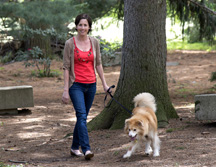Who is walking who? Dog lovers on the move for their canines
May 21, 2014
 |
|
Elizabeth Richards, an assistant professor of nursing who focuses on public health and physical activity, leads the Dogs PAW (Dogs, Physical Activity and Walking) study at Purdue University. Richards is evaluating possible methods to encourage dog owners to walk more often. The findings will be used to help design and test programs to encourage more walking. (Purdue University photo/Mark Simons) |
WEST LAFAYETTE, Ind. - The majority of those who walk their dogs regularly might be more motivated to get moving for Fido's benefit than their own health, says a Purdue University public health expert.
"Many dog owners don't consider their own health as much as keeping their dog happy and healthy," says Elizabeth Richards, an assistant professor of nursing who focuses on public health and physical activity. "The motivation is often for their pets' well-being, but owners benefit from the physical exercise, too. And the more we understand this relationship and behavior the better we can help people be more active. For example, finding time to exercise is often a challenge for people, yet those who own dogs find time. And people often say that a lack of confidence and social motivation are obstacles to being active, but a dog can be all those things for someone."
About 47 percent of homes in America have at least one dog, and about 40 percent of dog owners walk their dogs regularly, says Richards, who leads the Dogs PAW (Dogs, Physical Activity and Walking) study at Purdue.
"Engaging in exercising can be intimidating for some people if they feel overwhelmed by the gym environment or the amount of time or intensity they should achieve," she says. "But there is something accessible for many people when it comes to dog walking, and the bond between owner and pet is certainly part of that."
In the Dogs PAW study, Richards is evaluating possible methods to encourage dog owners to walk more often. The findings will be used to help design and test programs to encourage more walking.
Her work is funded by the Human Animal Bond Research Initiative and the American Kennel Club Canine Health Foundation, and she is collaborating with Niwako Ogata, an assistant professor of veterinary clinical sciences in Purdue's College of Veterinary Medicine.
Writer: Amy Patterson Neubert, 765-494-9723, apatterson@purdue.edu
Source: Elizabeth Richards, 765-496-9463, earichar@purdue.edu
